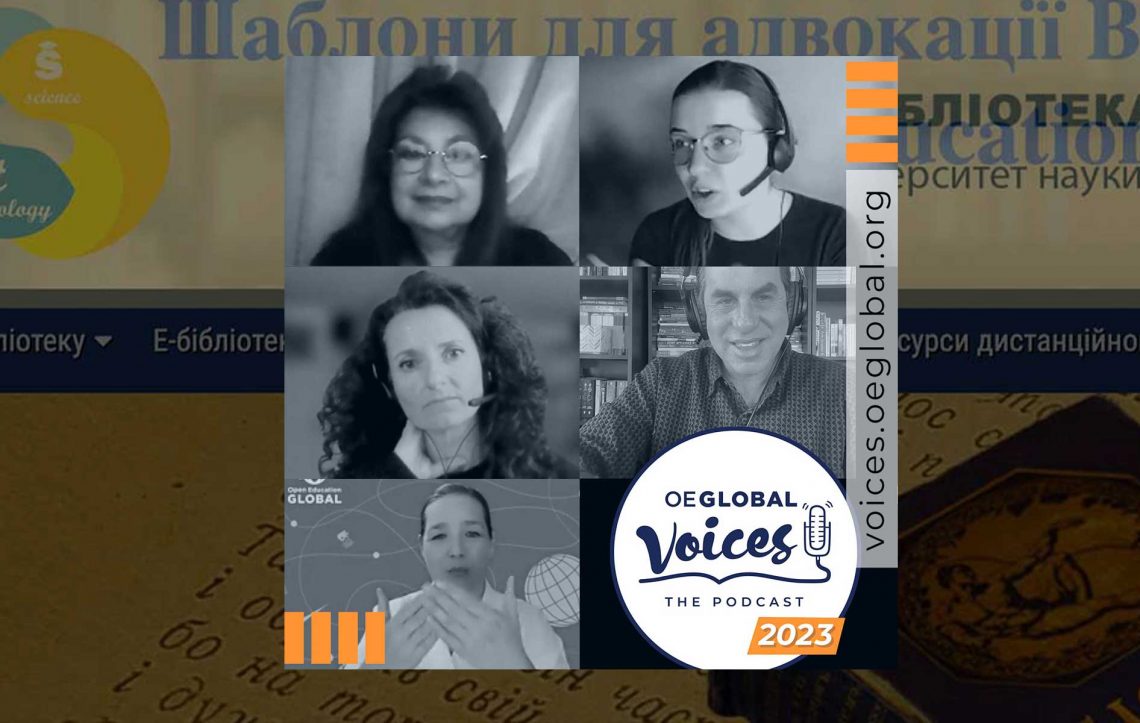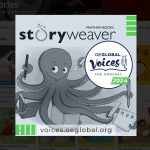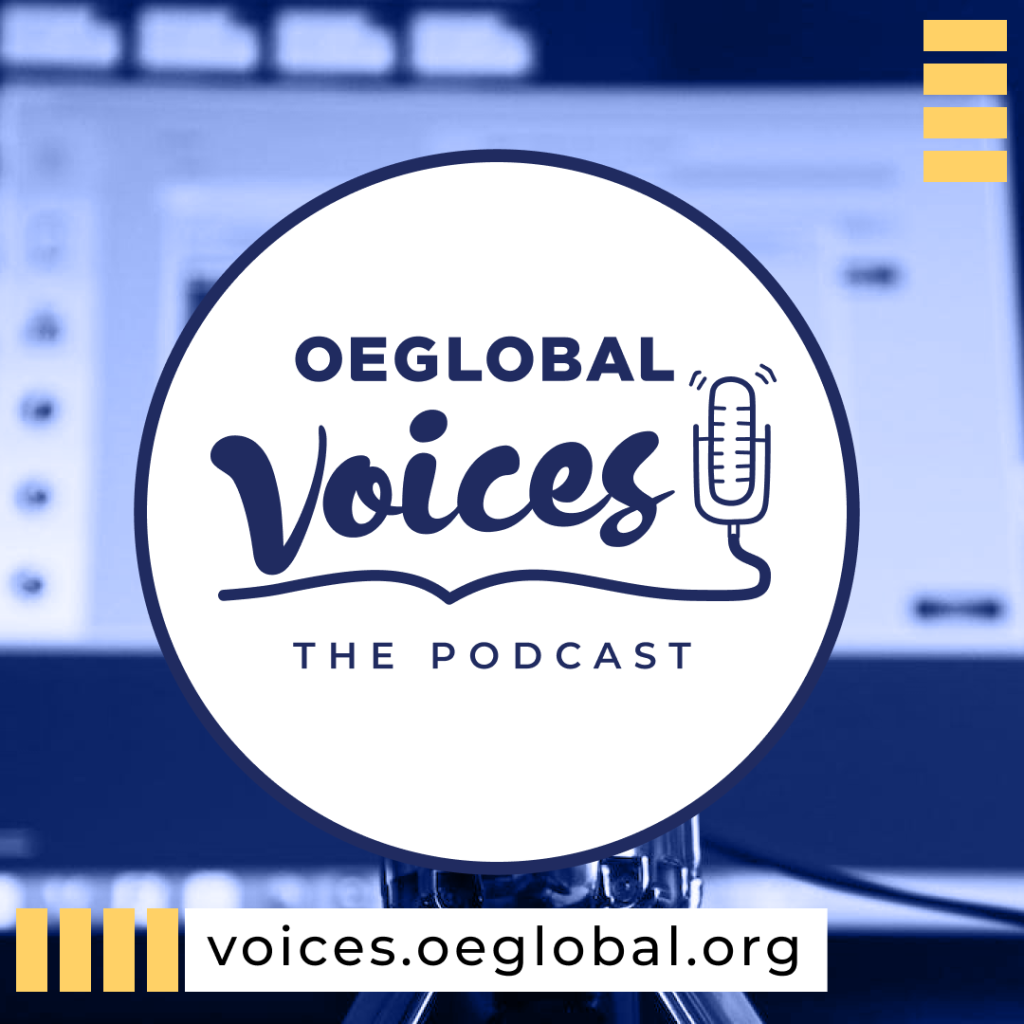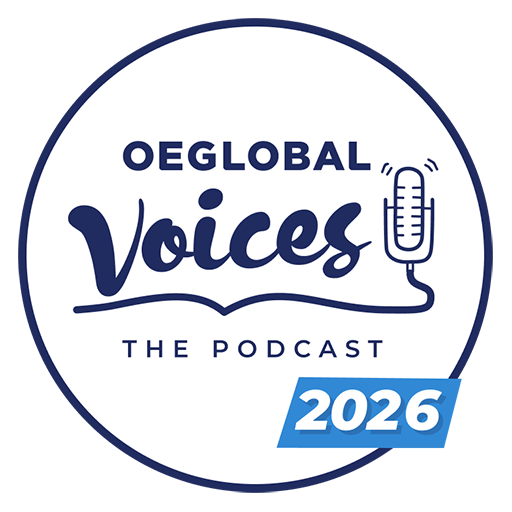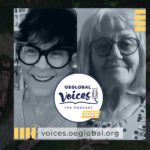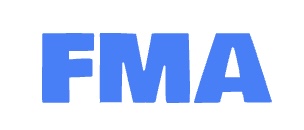The universe could not have aligned better for this episode. For Open Education Week, we schedule special recording sessions that are open to anyone interested in being in the studio with us, usually featuring winners of the most recent Open Education Awards. What could be better than organizing one around the 2022 Award for Open Resilience recognizing the heroic (or herOERic?) efforts of the Scientific Library of the Ukrainian State University of Science and Technologies during last year’s Russian invasion of the Ukraine.
We thought it might be a long shot when we invited Paola Corti, one of the European Network of Open Education Librarians (ENOEL) who coordinated the international effort to support their library colleagues in the Ukraine. Not only was the answer an immediate yes, she also coordinated to bring to the studio Tetiana Kolesnykova, Director of the Scientific Library at the Ukrainian State University of Science and Technologies located in Dnipro… “if she had sufficient electricity”!
How do you spell resilience? Start with a “U..K…R…”
Paola also arranged as well to have with us Mira Buist-Zhuk (University of Groningen) who provided amazing feats of translation for us. The event was added to the OEWeek schedule and we welcomed an extra guests to the studio who just wanted to be there.
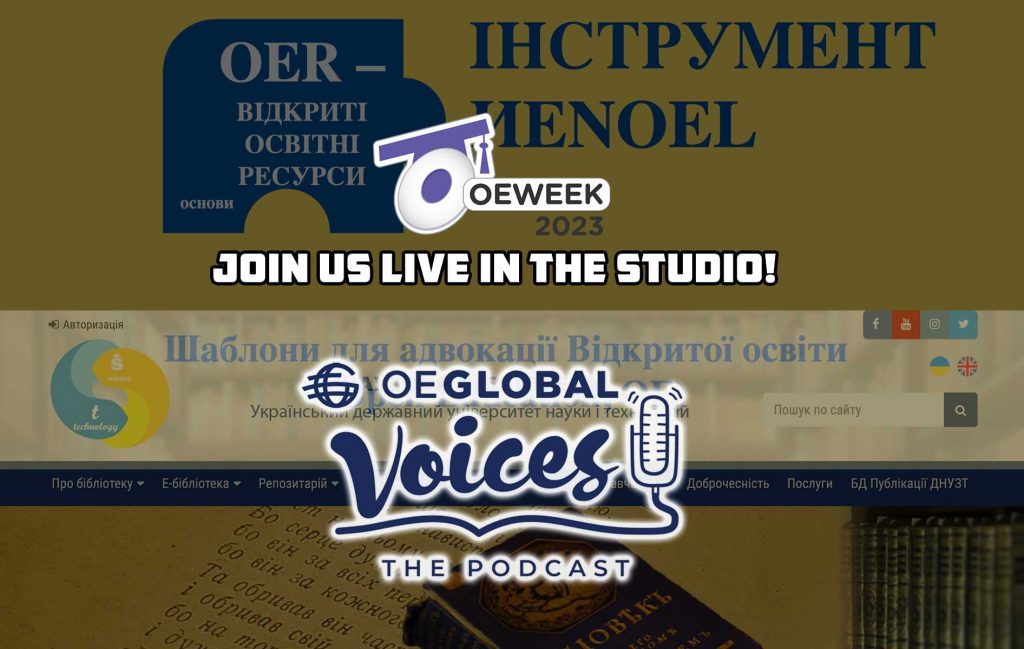
But wait, there is more! We happened to schedule this for Wednesday, March 8, the day of International Women’s Day.
And open education, open access journals, open science, were hardly new to the Ukrainian State University of Science and Technologies- Tetiana and her colleagues had been part of advocating openness since 2009. In fact, the day before the 2022 invasion, Tetiana, Paola, and Mira held an online meeting to discuss plans for an upcoming conference.
Listen in to hear Tetiana’s own voice, translated by Mira, almost calmly describe how just 3 weeks after the bombs fell on Dnipro on February 24, 2022, how the University staff, in basements and bomb shelters, operationalized its crisis plan and sought first to helped displaced students. The Ukrainian librarians went about doing everything to preserve their books and digital collections, assure access to resources by students and researchers, and most amazingly, were back at their library just three weeks later.
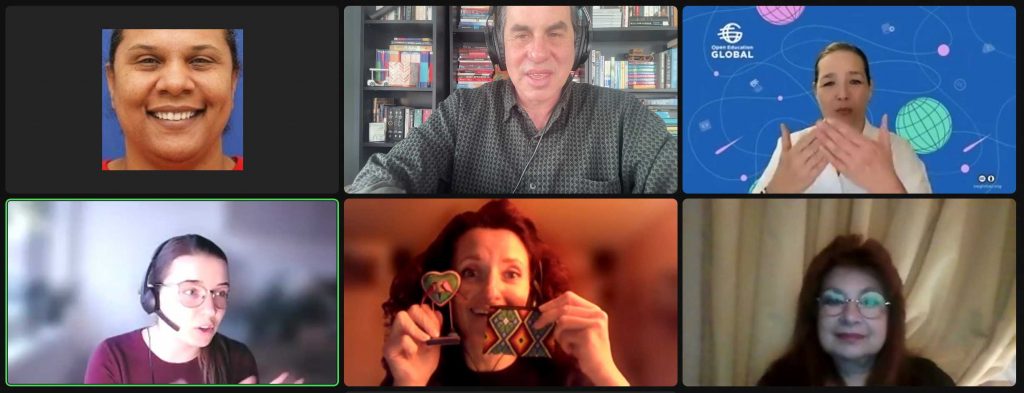
Not pictured OEWeek Guests Paul Stacey and Lorna Campbell.
This was, on all fronts, a most remarkable episode just to be there. Thank you Tetiana, Paola, and Mira for making this possible. And please, after listening, add your comments and questions below in our OEG Community conversation space.
Podcast: Play in new window | Download
Transcripts
Note: Ukrainian transcript generated with Google Translate.
References and Quotes for Episode 51
We are humans, we’re human beings. We are super resilient and flexible more than we think we are. And we are adaptable to new circumstances. And even when you think you’re not, you will find a way… to make it work.
….
It’s not just private life. Work is also a calling and a big part of their life indeed. And when you see that what you’re doing is meaningful, highly needed and requested by the community you’re trying to serve, it gives you the energy and the opportunity to go ahead, to go further, to persevere to go no matter what.
….
And work also serves as a distraction to people, of course serving your community, not just work in general, but serving your community as well. In order to go through all these explosions, tears, despair you need to distract yourself and preferably with something meaningful, something needed, something useful such as the work that the Tetiana and her colleagues are doing.
And in that way they also came up with lots of new ideas, creative path for achieving some new things and that is quite motivating and help them survive through those times, through that period.
Tetiana Kolesnykova via translation on resilience
- Advocacy work of the Scientific Library to advance Open Education in Ukraine (OE Award for Excellence, in Open Resilience)
- Ukrainian State University of Science and Technologies
And we go back in time to February 2022, just before the full scale invasion happened. So that was just business as usual. Before that, of course, they were busy as any other university library in the world. Busy preparing a report for the previous year for 2021. They were busy talking about future opportunities, development possibilities for the library and for the staff.
They were just busy assessing the potential topics for the university based conference, an international conference that their university hosts. It’s an annual event that happens in September, October of each year. And for some reason, they were thinking of dedicating the central theme of the conference the crisis times, Education, researching in times of crisis.
Tetiana Kolesnykova via translation, speaking of the February 23, 2022, the day before the bombing of Dnipro
So the answer to this question goes back to 2009 when Tetiana and colleagues talked to the university management and some university researchers into hosting an institutional repository, which was a big step towards the openness and towards open science… the scientific library where Tetiana works and is director of, is the one managing and hosting that repository.
And so already in 2011 they managed to launch the first open access journal in cooperation with the faculty of humanities, the philosophy department they were proud of this in their region. The first in the region And today this journal still exists and it’s being indexed in the Web of Science. So it’s a continuous effort.
Building this expertise, building this capacity, they were able to launch two more open access journals. So in total, they’re now supporting three open access journals. One of them is a library centered, dedicated journal. It’s being indexed in Scopus as well. And it’s the only open journal in Ukraine related to library open access.
Tetiana Kolesnykova via translation on open access publishing
- Open Education and Publishing at the Scientific Library
- OER Information
- OER Resources in Ukrainian
- Scientific Library YouTube Channel
- eaDNURT (digital repository)
- e-journals
And so the next issue they had to resolve after making sure everybody’s at least safe, they had to decide what to do with their digital infrastructure, what to do with their digital objects and digital repositories they’ve been working so hard on, whether they needed to evacuate servers that were hosting all that information, all those digital objects.
[T]he reality of that situation was that its mostly women who were left working at the library, at the university in those war conditions. And it was quite scary to get out, scary to get out of the house with air raid alarms happening every 30 minutes or so. They were hiding in bomb shelters.
….
But already a few days after that , some of the colleagues started returning to the library, to the university, especially those who lived nearby or who could arrange the transportation because public transportation wasn’t working back then.
They had to return, they had to resolve some very crucial issues, some urgent tasks that they as a library had to take care of. And Tetiana is really grateful to her colleagues for their time and risking their lives literally while doing that.
….
So other librarians would understand this as well, says Tetiana. Every librarian knows that there is a sort of like a manual, what to do in emergency situations. And task number one is to try and rescue the books, try and rescue the objects you have in your library.
Tetiana Kolesnykova via translation on first efforts by the Scientific Library
- Open Education developments in Ukraine in times of crisis: A librarian’s perspective (translated letter from Tetiana shared by Paola Corti in OEG Connect, June 2022)
90% of their teachers have already returned back to work, and they all work from the Ukraine. Most of the students are back too back to Ukraine. Of course, those who went to fight, who joined the Army both students and professors, they get extension of their contracts or extension of their study programs. Many have returned. And Tetiana is also happy to say that the student numbers for the next study year, for the next academic year are growing and they will be larger than they were last year.
It’s restoring a little bit even in such difficult circumstances.
…
They’re also donating their campus buildings to internally displaced, those from other regions of Ukraine that are now heavily affected by fighting, by the active war, people from Donetsk, Luhansk regions, people from Mykolaiv, from Kherson, from all those cities that are either currently occupied by Russia or have just been liberated by the Ukrainian army.
Tetiana Kolesnykova via translation on the current situation at the University
The irony of the situation is that the war actually accelerated the adoption of Open Education and OER. On the one hand, a desired outcome. On the other hand, the circumstances are far from ideal. So ironically, the war is playing in favor of Open Education… this situation now is not comparable to the situation as it was in 2009 in terms of the development of the topic of Open Science, Open Education at their university, because back then when they were just starting the teachers, it was quite difficult. The teachers were laughing.
They were accusing them of trying to infringe on their intellectual property. Oh, why would I, submit my article or why would I do things in the open anyway. The situation has changed dramatically by now despite everything.
Tetiana Kolesnykova via translation on an unexpected outcomes of the war situation
Postscript
After sharing this episode with Tetiana, she shared these words via email:
You made me and my family extremely happy people late last night!
In my previous life (before the war), I would never have thought that I would be a part of such a wonderful international project. In addition, you created a very cozy and friendly atmosphere in which I, as a guest, felt very comfortable.
At the beginning of the meeting, I was very nervous because: firstly, I didn’t have such experience in recording; secondly, I didn’t have time to prepare; and thirdly, I didn’t know what questions you would ask me. But your kindness and sincere support, the enormous help of Paola and Mira, as well as the pleasant faces of Marcela and the other participants in your online studio, removed all barriers.
Thank you very much, Alan! You, along with Paola and Mira, gave me wonderful emotions!
Alan, my colleagues and I (librarians, teachers, researchers) are also very interested in creating opportunities for collaboration. I would be happy to bring your suggestions to them. I look forward to it.
Thank you very, very much to you, your friends in the studio, your family and everyone who supports Ukrainians in this terrible war.
Your help is invaluable.
Tetiana Kolesnykova email message
Our open licensed music for this episode is a track called War Mode by Kirk Osamayo licensed under a Creative Commons Attribution 4.0 International License.found, like most of our intro music, in the Free Music Archive (see our full FMA playlist).
The introduction created with the OEG Voices Mixer features voices of Shinta H, Florence D, Clint L, Paul S, Lena P, Patrina L, Terry G, Bonni S, Vera K, Lisa Y, Shannon S, Alex E, Ajita D, and Rajiv J. (learn how to add your voice to the mix).
Again, on a production note, this was another episode we used Descript for transcribing and editing audio that has enhanced our ability to edit and transcribe our show.

